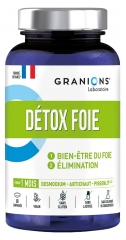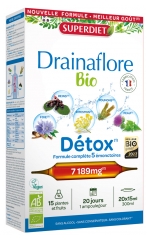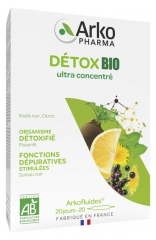A healthy liver:
protect it, clean it, detoxify it
Written by Paul Musset, Doctor in Pharmacy | published on | updated on 15/04/2024

Our liver is a large organ with multiple functions: filtering the blood, eliminating toxins, storing and reusing nutrients, digesting, etc. However, are you really familiar with this organ and how to keep it healthy? Do you also know how to detoxify the liver gently and naturally? Don’t worry, we’ll explain everything.
The liver: The largest gland in the body
The liver is one of the most important organs in the body, both in size and in its essential role in our metabolism. More or less triangular in shape, it is located at the top of the abdomen, under the diaphragm, and a little bit right of centre. It is surrounded by a kind of sheathe called Glisson’s capsule. Like the brain, it represents about 2% of our bodyweight, between 1,400 and 1,500 grams. It is our largest gland.
Can the liver regenerate itself like Prometheus’ in the myth?
Yes, the liver has the special ability of being able to regenerate itself. However, unlike the Titan in the myth, it does not repair itself overnight. If part of this organ is lost and at least 10% remains, it can restore itself completely in less than a year.
What is the purpose of the liver?
The liver filters the blood through its hepatocytes to sort through what needs to be kept and what needs to be eliminated. However, that is not all. Its functioning is complex and it fulfils many roles in our organism. Here are the main ones:
- It produces bile, which is concentrated by the gallbladder and delivered into the duodenum to aid digestion; it provide proteins called immunoglobulin A1, which protects the intestine; and it excretes various substances, such as excess cholesterol, toxins, etc.
- It produces proteins such as fibrinogen, which helps in blood clotting, and others such as albumin, which plays a role in regulating blood pressure regulation and carries various molecules in the blood.
- It stores sugar as glycogen and then redistributes it when necessary as glucose. If it receives too much sugar, it stores it as fat.
- It is used to store certain fat-soluble vitamins (A, D, E, K).
- It destroys used red blood cells.
- It transforms protein waste into urea, which it then sends to the kidneys to be excreted in urine.
Diseases and dysfunctions of a maltreated liver
Steatosis
The most common liver disease is probably steatosis, which affects 20-25% of the population. It results from the presence of fat in the liver. While it is asymptomatic and reversible, it can lead to more serious diseases if there is no dietary change. The foie gras so appreciated during the Christmas holidays is a very visible example of steatosis …
Hepatitis
Viral hepatitis is caused by viruses and it has an acute form that can sometimes turn into a chronic form. When encephalopathy appears, the hepatitis is referred to as fulminant hepatitis and can be fatal.
Liver fibrosis
Hepatic fibrosis occurs when fibrous scar tissue replaces the functional cells of the liver damaged by a variety of factors. Once a certain proportion of the liver has been affected, this is referred to as cirrhosis.
Cirrhosis
This is mainly due to alcohol and viral hepatitis. The liver has too much scar tissue and can no longer perform its function properly. This disease is irreversible and causes many complications, some of which are serious (including digestive bleeding and liver cancer).
Liver cancer
Liver cancer can be either “primary”, i.e. born from the cells of this organ, or metastases of cancers that have started in other parts of the body.
A healthy lifestyle to protect the liver
The first rule to preserve your liver is to limit alcohol consumption as much as possible. Indeed, ethanol is processed by the liver where it is transformed into a very toxic molecule called acetaldehyde. Its presence causes harmful molecular bonds that lead to steatosis, then fibrosis and cirrhosis …
Too much fat or sugar poisons the liver, which cannot process everything properly. We must be careful of all excesses, but also of medications, synthetic hormones, foods containing heavy metals, etc. It is worth remembering that everything passes through this filter with multiple vital functions. To help the liver do its job, it is important to maintain its overall health by engaging in regular physical activity, drinking plenty of water, as well as eating a balanced and healthy diet. Some foods are very beneficial and help to detoxify the liver: artichoke, black radish, dandelion, chicory, garlic, olive oil, green tea, turmeric, etc.
Liver purification, detoxification: How it works
Everything we absorb goes through the liver. This means that the liver can quickly become overwhelmed, especially if you eat too much sugar or fat and drink alcohol. Not to mention all the chemical molecules found in our modern lives for which the liver is not designed. Detoxifying the liver involves offering it the purity and lightness of healthy drinks such as water, tea, herbal teas, vegetable broth, lemon juice, etc.
Liver cleansing: Natural remedies
How can the liver be cleansed so it works better? By drinking plenty of water and taking advantage of the resources nature provides. The liver detox products offered by Cocooncenter are composed of substances of natural origin, which have properties that promote liver detoxification. They help it to get rid of the toxins and unwanted substances that clog it. A simple herbal tea for the liver can work wonders!
It is especially very important to purify your liver. The useful products include extracts of black radish or artichoke in the form of vials or capsules, as well as dietary supplements containing natural substances and nutrients that promote overall digestive well-being (liver, stomach, intestine, etc.): turmeric, fennel, lactic ferments, vitamins and minerals, etc. Remember to keep some at home during the holidays, there is no better way to cleanse the liver after drinking more alcohol than usual.
Liver diseases often present no symptoms for a certain period of time. You should not wait to feel this essential organ dysfunctioning before taking care of it with a healthy lifestyle!
Three key points to remember about liver detoxification:
- The liver is a vital organ that must be protected because it plays a fundamental role in many aspects of metabolism.
- A good meal or a party is fine on occasion, as long as you don’t make it a habit and compensate for the excess with a detox period to cleanse your liver.
- Natural remedies and a healthy lifestyle are usually enough to keep your liver healthy throughout your life.




















